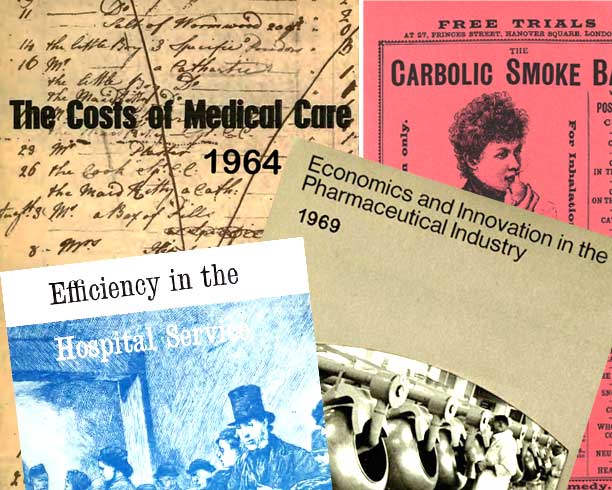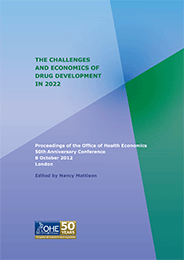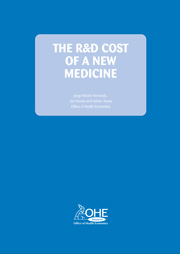Sign up to our newsletter Subscribe
Analysing Global Immunisation Expenditure

Sign up to our newsletter Subscribe


Today we celebrate OHE’s 2 April 1962 founding with the launch of our new archival website, ohematerials.org. This site contains OHE’s publications from 1962-2002. The most recent ten years of publications can be found on our main site, ohe.org. Today…

Today we celebrate OHE’s 2 April 1962 founding with the launch of our new archival website, ohematerials.org. This site contains OHE’s publications from 1962-2002. The most recent ten years of publications can be found on our main site, ohe.org.

Today we celebrate OHE’s 2 April 1962 founding with the launch of our new archival website, ohematerials.org. This site contains OHE’s publications from 1962-2002. The most recent ten years of publications can be found on our main site, ohe.org.
1962 was an important year in health care in the UK. Two key changes were underway that would dramatically affect the pharmaceutical industry for decades to come. Just five years earlier, in 1957, the first Voluntary Price Regulation Scheme (now the PPRS) was adopted, setting the tone for pricing for the next fifty years. In 1962, the Committee on the Safety of Drugs (CSD) was formed in the wake of the thalidomide tragedy. Its objective was to advise, on the basis of safety and efficacy, whether a new drug should be made available on the market. The CSD was replaced when the 1968 Medicines Act made prior approval mandatory and created the Committee on the Safety of Medicines.
1962 also was the year that Sir James Black discovered the first clinically significant use of beta blockers, with propranolol and pronethalol, revolutionising the treatment of angina pectoris. That same year, the oral polio vaccine was introduced in the UK and a new routine immunisation programme was begun. Other long-time scourges were nearly gone – tuberculosis killed 3,000 in England and Wales in 1962, down from over 48,000 per year in the late 1940s. OHE’s first publication examined the economic and social gains from drugs that battle tuberculosis.
Extensive changes were taking place in the NHS in 1962. An ambitious hospital plan was launched to replace seriously outdated infrastructure and create district general hospitals. General practitioners were increasingly upset about pay structures and published the Porritt Report, which criticised the rigid separation of the NHS into hospitals, general practice and local authorities. The report called for unification of the three, sparking a lasting debate on the structure of the NHS.
The changes since 1962, of course, have been extensive in all areas of medicine and in the NHS. Perusing the fifty years of OHE publications, however, show that some issues are perennial. Persistent themes, for example, include the cost of the NHS, how best to organise the NHS and the effects of change in the NHS on both the quality and cost of care. Since the early days of the OHE, another key issue has been how best to define, encourage and evaluate innovation in medicine and medicines. Although perspectives and approaches have evolved, the basic questions have changed very little.
Particularly important changes that have occurred over the fifty years include, for example, the appearance and now-routine use of health economics and health technology assessment methods; the first OHE publications on these topics appeared in the mid 1980s. Attitudes towards ‘the patient’ have changed markedly, too, from being well-meaning but paternalistic, to understanding that the active involvement of patients is crucial both to the success of treatment and to defining the value of care.
During the rest of the year, we will be looking at some of these themes in this blog, using OHE’s publications to track perspectives and policies. We hope that this extensive catalogue will be useful to others who wish to understand better how issues in health care have evolved over the past fifty years and what may be in store in the future.
An error has occurred, please try again later.
This website uses cookies so that we can provide you with the best user experience possible. Cookie information is stored in your browser and performs functions such as recognising you when you return to our website and helping our team to understand which sections of the website you find most interesting and useful.
Strictly Necessary Cookie should be enabled at all times so that we can save your preferences for cookie settings.
If you disable this cookie, we will not be able to save your preferences. This means that every time you visit this website you will need to enable or disable cookies again.
This website uses Google Analytics to collect anonymous information such as the number of visitors to the site, and the most popular pages.
Keeping this cookie enabled helps us to improve our website.
Please enable Strictly Necessary Cookies first so that we can save your preferences!


